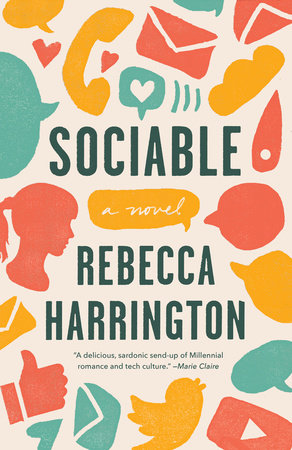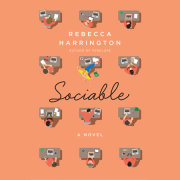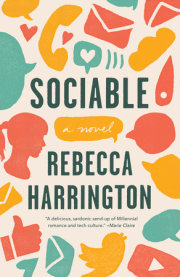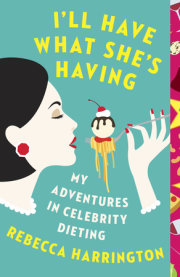Chapter 1Facebook: An article called “15 Images of a Sloth That Will Just Make You Laugh.” Comment: “Mike Moriarty [hyperlinked] I feel like you are totally number 7.” Elinor posted this at 4:00 p.m. on a Tuesday. It was liked thirty times, mostly by relatives.Twitter: 30 tweets. A sample: “This is why Marianne Goodacre is my favorite writer.” The link is to a quote about writing being difficult but also rewarding. It was favorited two times by people Elinor didn’t really know that well.Instagram: 2 pictures. Picture 1: An attenuated, wolfish-looking animal, a dog. The dog is collapsed on the sidewalk and tied up to a fire hydrant with a yellow nylon leash. Its legs are somewhat contorted on the ground. There is a sepia-tinged filter on the picture that gives it an oddly flat quality. For example, an irregular blob of gum is somehow in hyperfocus—the same as the dog. Caption: “Mike saw this lil guy just chilling out near our Sunday brunch spot. #goals.” It was liked fifteen times.Picture 2: Elinor and her boyfriend (Mike). It’s a selfie. They are smiling on what seems to be the Brooklyn Bridge (there are brownstones, industrial water, and cables behind them). Elinor has her arm slung around Mike’s neck. She is kissing his cheek. It is a very flattering picture, of Elinor especially. Her jaw looks thin. Caption: “Walking across the Brooklyn Bridge for our anniversary #lovethisguy #brooklynlyfe #bkbridge.” It was liked twenty times.• • •
It was midway through the party and everyone was drunk in a professional but sloshing way, when we saw Elinor, hovering near a table, holding her coat. The table had three red bowls on it, filled with identical anemic chips. Elinor took a chip out of one of the bowls and ate it. No one had done something like that during the entire preceding hour.
We were in a small backyard dotted with the occasional tuft of stodgy, bulbous grass. A Twister tarp lay discarded under a tree, getting dirtier as people stepped on it. Lights with large filaments dotted the railings, which gave the gathering an aesthetic that recalled other parties in the same general milieu, and existing pictures.
The party was celebrating or mourning the fact that the Newr Report, a news website (www.newrreport.com/news), was going out of business. It was going out of business because it hadn’t ever made money. Websites couldn’t go on forever in that kind of environment—but it did go on for a fair bit of time. And when you took it all together, there were twelve years of events collected in some ineffable space somewhere. So it wasn’t nothing.
Elinor twisted a bit of her hair in two fingers. She had been alone near this chip table for a long time and she knew no one at the party. Her coat was so heavy and made out of felt. Mike was gone. Was he in the bathroom, inside the house? He had said he wanted to get a drink. She had already looked at Instagram. She had already read an article on her phone. She had already texted two people. She had already been in the proximity of others and not talked to them (it was why she was at the chip table in the first place). How much more could she do?
A vulpine cat sauntered between Elinor’s legs. It had been wandering the party the entire evening. It was Andrew Newr’s cat, and as such, it had a kind of notoriety. The cat had an Instagram account, for example, in which it would sometimes travel to Malta or lie curled on a bed. Elinor bent close to the cat and trained her phone on it. The cat immediately sprinted away, to hide under another metal-legged chip table about ten feet away.
“I’ve been trying to take a picture of that cat all night,” said a girl who had been standing near Elinor this entire time but not talking to her. She had been talking to a guy wearing a crumpled blue shirt and crumpled brown pants. “That cat is so cute. That cat was everywhere at that office. I can’t fucking believe it.”
“I was going to caption the picture #partycat,” said Elinor, shyly.
“OMG, that’s funny,” said the girl. Elinor dropped her coat on the ground, next to the chip table, kicked it under the table, and got dirt on it.
“So, did you guys work at Newr Report?” said Elinor.
“No,” said the girl. “But I knew people that did. It’s so so so sad.”
“I know,” said the guy. “It’s really extremely fucked up. Late capitalism.”
“The cat is back.” Elinor could see the cat slinking out from underneath the other chip table. Other people, people next to that chip table, started taking pictures of the cat and the cat bowed to their lenses, and seemed to smile at them bashfully.
“That cat is like, basically a meme,” said the girl. “A meme that hated you.”
The guy laughed at that, crumpling his shirt more.
“Memes are always of like, a grumpy-faced thing. I don’t think the cat hated me,” said Elinor.
“Attention,” said the founder of the Newr Report, Andrew Newr. He had emerged on a deck that jutted in a Scandinavian fashion from the back of his house. He was extraordinarily thin. Odd bones emerged from his face that Elinor had never seen before on another human person. One under his eye—another in his forehead. Where was Mike?
“Thank you all so much for coming.” Andrew Newr cleared his throat. “I wish I was surrounded by some of my favorite journalists for a better reason.”
Someone hooted forlornly in the audience, like a barn owl.
“When I started the Newr Report, I was very different than I am now. I was less gray.” The party chuckled lightly. “I knew far less about the Internet and I hadn’t had the privilege of meeting all of the great people here today. But I did know some things. I did know the power of a great story. And I had the privilege to work with some incredible journalists to create some incredible stories. Stories that mattered. Stories that made me laugh. Stories that made me think. Especially now . . .”
The speech droned on. As it progressed, Elinor felt even sadder that the Newr Report was going under. It seemed like such an important thing now that Andrew Newr was explaining it, and Elinor almost felt ashamed. Why hadn’t she read the Newr Report all the time? She had thought it was a normal website that chronicled normal things, like celebrities walking to their cars. The last story she remembered reading on it was called “10 Ways to Maximize Your Productivity Zone,” which was a slide show about study habits and work productivity illustrated by luridly colored photos of a woman splayed near a computer, holding her head as if gripped by intense pain.
“It’s so sad,” whispered the girl Elinor was standing next to. Andrew Newr was still talking.
“I know,” said Elinor. “It sucks. I read the Newr Report every day.”
Elinor saw Mike silently emerging from a door underneath the Scandinavian deck. He was accompanied by a girl. They both took places near the deck to watch the progress of Andrew Newr’s speech, which was still going. Mike said something in the girl’s ear, and she looked at him and smiled. The girl, if Elinor remembered correctly, was named Andrea. What was Mike doing talking with Andrea? She wasn’t mad, because it was a free country and Mike could talk to whomever he wanted to and it was good that he had female friends, and Elinor wasn’t a jealous person at all. No one had ever said to her, “You are a jealous person,” ever once. She was just a person. But at the same time, how could he leave her alone all of this time? It was inhumane.
So maybe she was slightly angry and distracted when #partycat returned. She certainly wasn’t looking at the cat when it eventually attached itself to her leg. She just stood there listening to the mild buzz of Andrew Newr in the background, and perhaps feeling a slight pressure on her leg if she thought about it. When she finally realized it was the cat, at first she was happy! She reached down to pet it. It was only when the cat sank its first tiny claw into her leg that she looked down and understood what was happening. That #partycat had turned against her.
At first she tried to delicately and silently jog her leg free of the cat’s grip, but the cat seemed to hold on even tighter. Then it bit her in revenge for what was, in Elinor’s opinion, very mild shaking. Elinor let out a small cry. Two people turned around and looked at her. In an effort to contain and modify the spectacle, she knelt down toward the cat and tried to pry it off with her fingers. But this seemed to enrage the cat even more. It slashed at Elinor’s face and came in actual contact with her neck and produced a thin scratch that immediately sprouted blood. Elinor yelped and sprang up. There was excessive startling. Someone else shushed her. Andrew Newr was still talking.
“Hey, did you do something to #partycat?” a guy wearing a small and maroon sweater said as the cat slashed and slashed at her leg, and theatrically hissed, and hysterically coughed.
“No, I didn’t do anything!” whispered Elinor, standing up quickly. “I absolutely did nothing to this cat.” She kicked her leg then. The cat flew about three feet and landed on the Twister tarp. But the cat was fine! It immediately started running up a tree. So all the tweets about it were really uncalled for. She didn’t even interrupt the speech.
• • •
Elinor and Mike left the party soon after that. On the street, it was cold now, although it had been an unseasonably warm November. Leaves clung to the insides of gutters. The sidewalks dribbled leftover rain. It took her a while to flag a cab.
“I’m tired,” Mike said, when they finally sat down in the taxi. He pressed his head into Elinor’s shoulder and Elinor had a horrible desire to shrug her shoulder into his temple, but she didn’t do it.
“We could’ve left earlier!” she said. She tried to make it sound like she was joking.
“I guess so.” Mike yawned.
“You looked like you were having fun. So I didn’t want to just leave or something. Even though a cat literally attacked me.” Elinor looked out the window. They were pretty far away from their apartment. It was probably going to be an expensive cab fare. They should have just taken the subway.
“Well, it was okay. I don’t know. It was fine, I guess.”
“I saw you talking to some girl,” said Elinor. “What’s her name?”
“Oh, Andrea?” said Mike. “Yeah, I guess we talked.” He moved his head off Elinor’s shoulder and opened the window a crack. A thin stream of cold air hit her in the nose. The insides of her nostrils burned.
“You’d like Andrea a lot. She’s funny. She works at Memo Points Daily.”
“That’s cool.”
“Actually, she told me there were some open positions there. She thinks I should apply.”
Elinor stretched across Mike and rolled up the window.
“I don’t know if I want to work there though. You don’t have a chance to write at all. I feel like you just compile political factoids into lists. Or you tweet. Can you imagine tweeting for your job? I’d fucking die.”
“Yeah,” said Elinor. She thought there could be worse jobs. Her job right now, for example. But that was a difference between the two of them. Mike went on and off Facebook and occasionally even read a physical paper. Elinor spent so many hours on the Internet taking quizzes, she actually felt guilty at night.
“She thinks they would like my piece on healthcare policy though. I was thinking about pitching it to them.”
“Oh really?” said Elinor. Mike had been trying to get that published for 5 months. It was 11,000 words and he refused to cut any of it.
Elinor had never talked to Andrea but she had seen her around. She might have even seen her instagram—it was appearing to her in flashes (a selfie but only of eyes, bright sun on some kind of field, a European town). She was a friend of Mike’s from some time in his life that he had never made entirely clear to Elinor, and she was really really skinny. At the party, she was wearing a kind of orthopedic shoe that was probably very fashionable. Elinor had been really inappropriately dressed for this party, she realized while she was there. She wore a low cut shirt and flesh-colored high heels that had rendered her feet blotchy and cold At this party, everybody was wearing a black smock and wooden clogs, like they were about to attend a Dutch funeral.
“We were just talking about how dumb it all was,” said Mike. “You never read long stories anymore. It’s like its dead.”
“I don’t know if that’s true,” said Elinor. “I feel like I read long stories all the time. They are so long I can’t even finish them.”
“You probably mean the New Yorker,” said Mike. “That’s the only magazine that publishes long stories anymore. It’s like people have ADD. People have no attention spans.”
“Can we just not talk about this? It’s boring.”
“Ok.” Mike puffed out his lips and exhaled loudly. “You’ve been acting so weird all night.”
“No, I haven’t! I’ve been fine. I’ve been totally normal. I also was literally attacked by, like, an animal.”
“Whatever,” said Mike. “If you aren’t going to tell me what’s wrong, then I don’t even know what to say.” Elinor didn’t answer him. Suddenly, she realized she was filled with rage. She started looking in her handbag, a large satchel made of plastic leather substitute. She felt around for her phone on the bottom.
“Are you going to just look at your phone now?” said Mike.
Elinor didn’t say anything. She took out her phone. No one had texted her, but she looked at it anyway.
Copyright © 2018 by Rebecca Harrington. All rights reserved. No part of this excerpt may be reproduced or reprinted without permission in writing from the publisher.


































































































